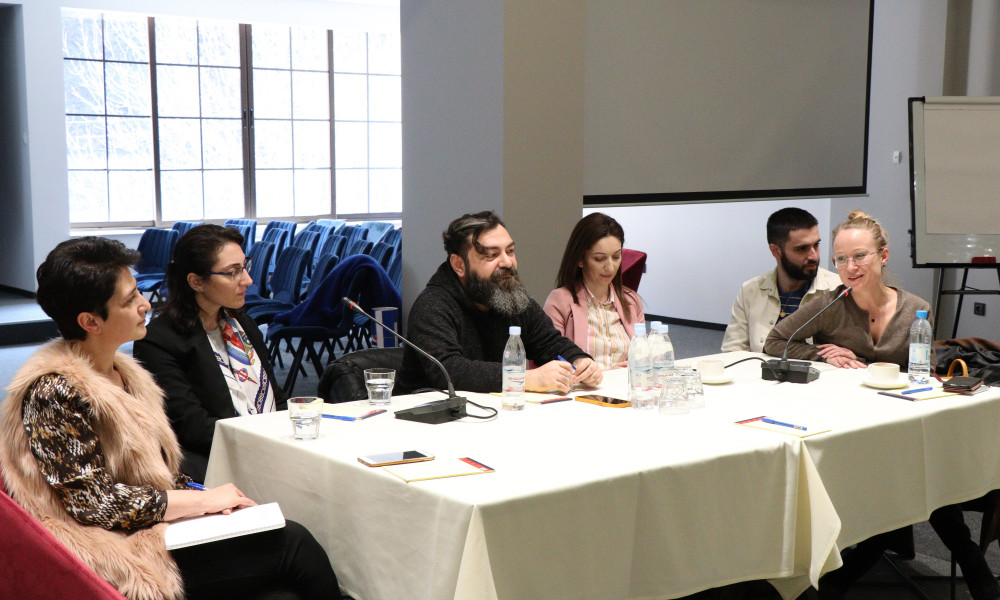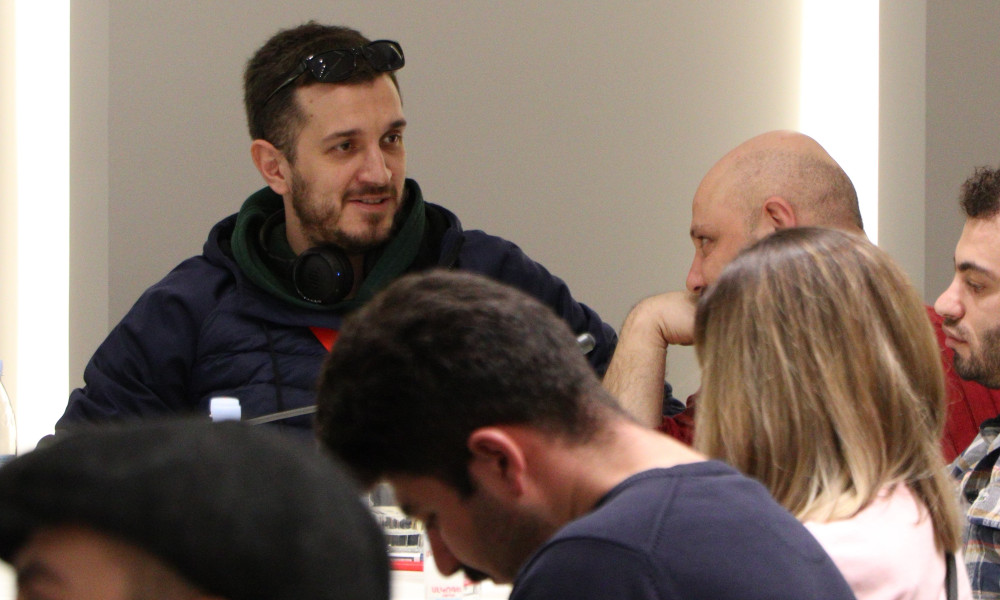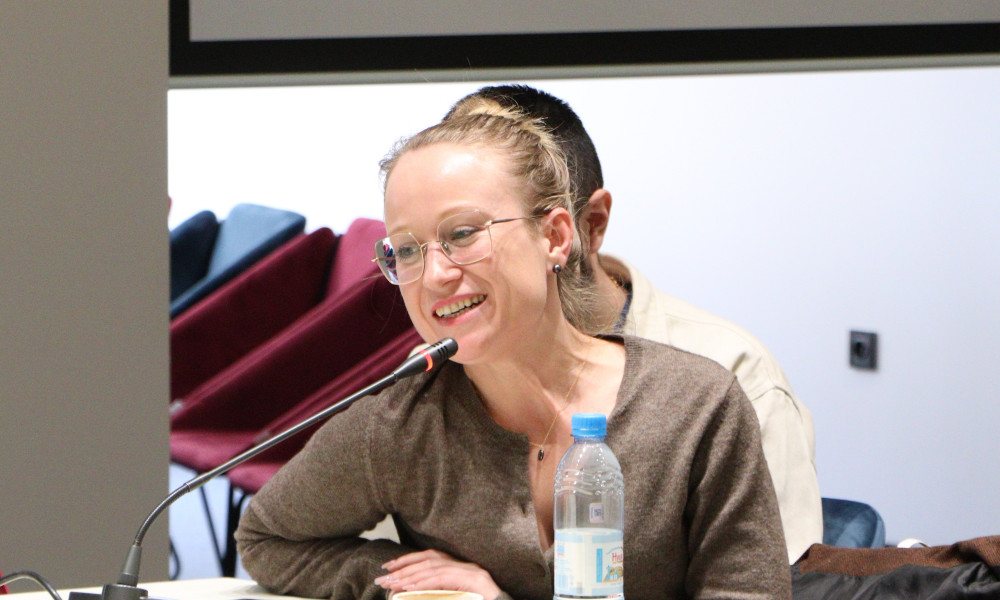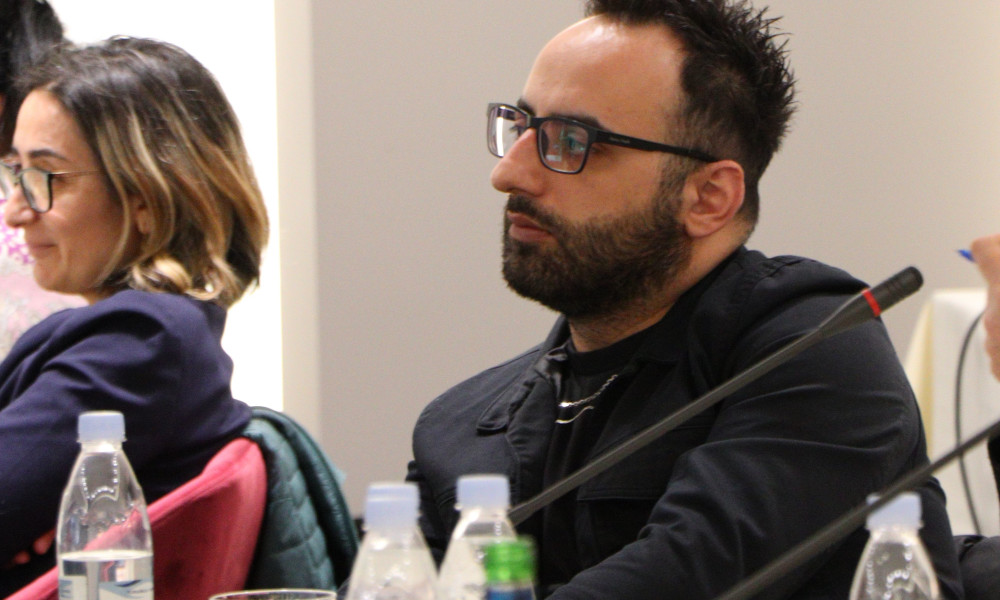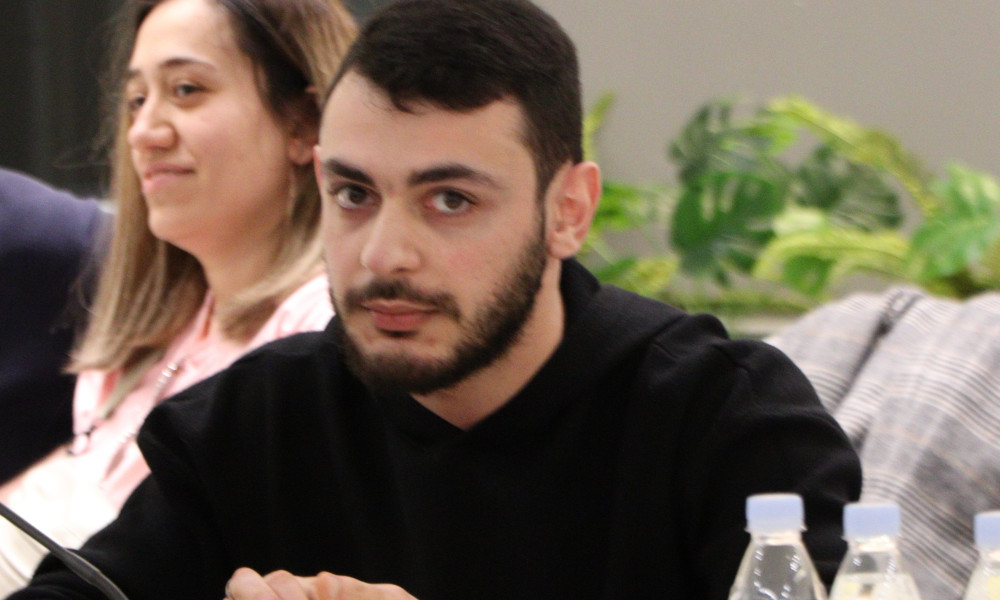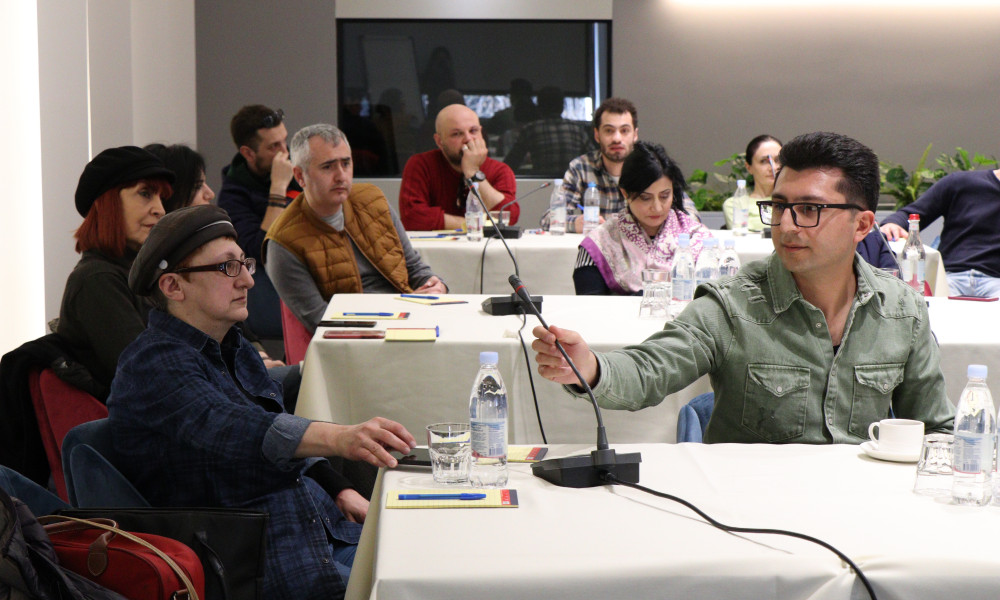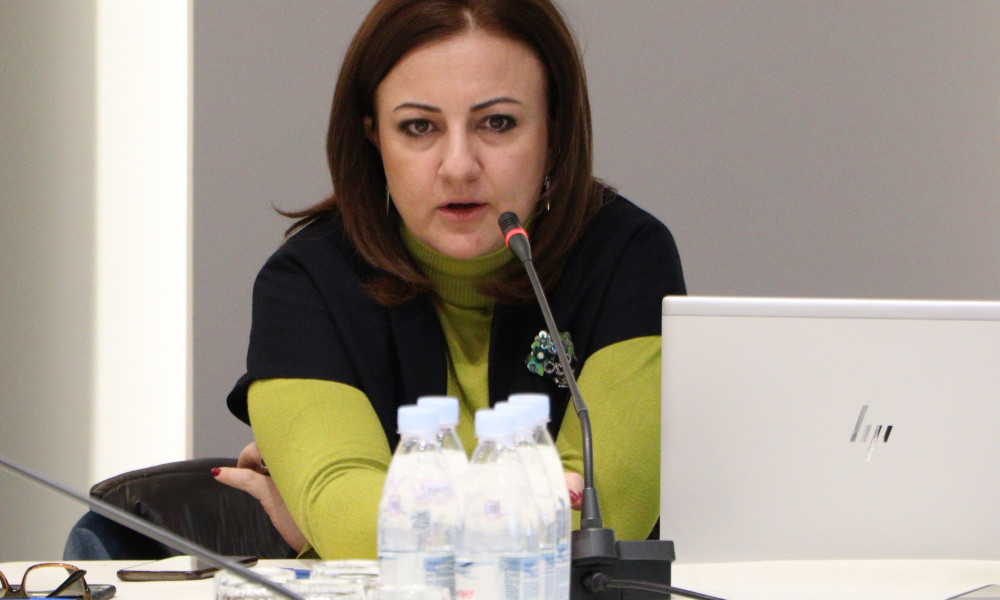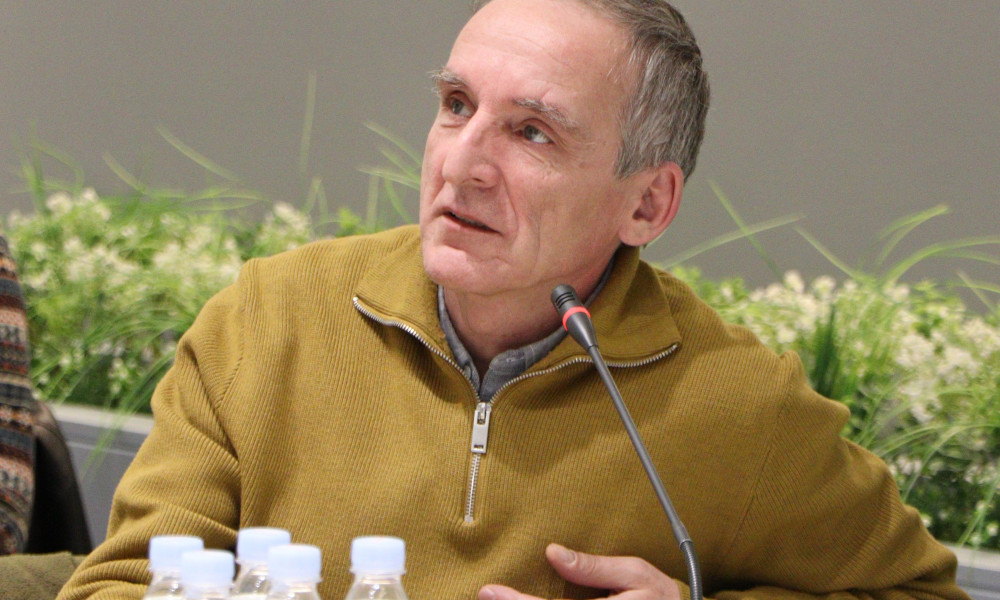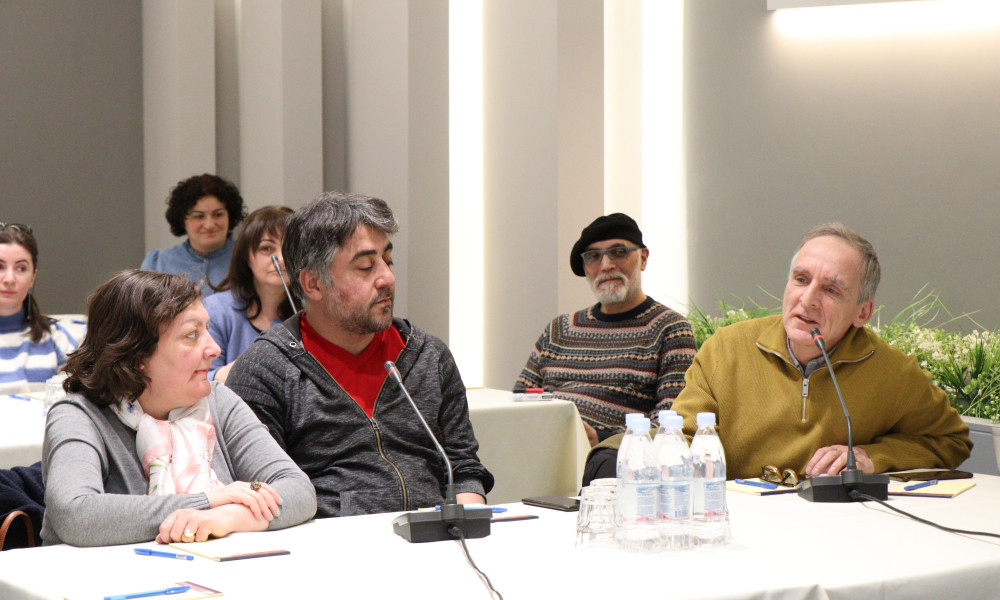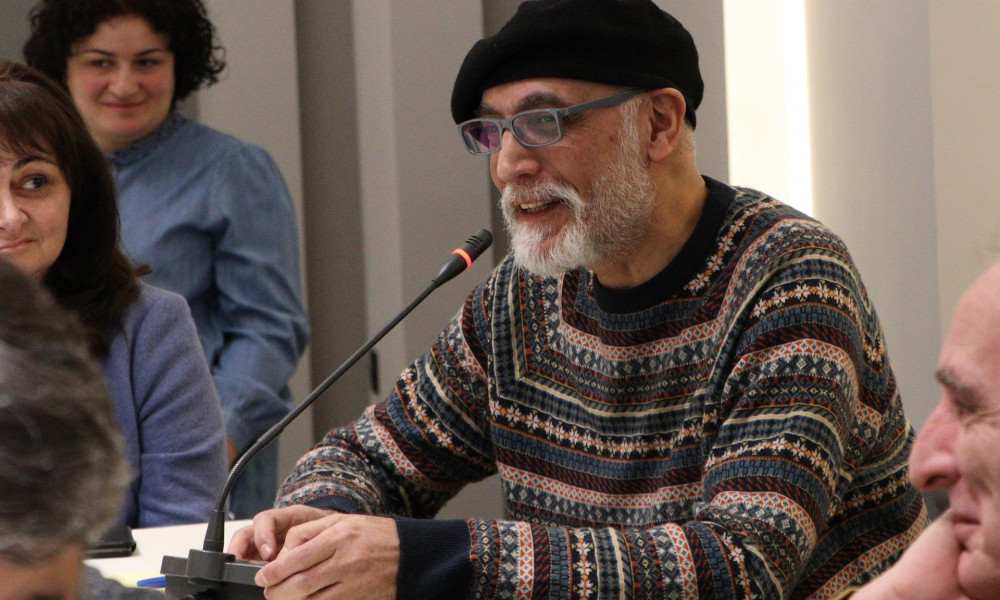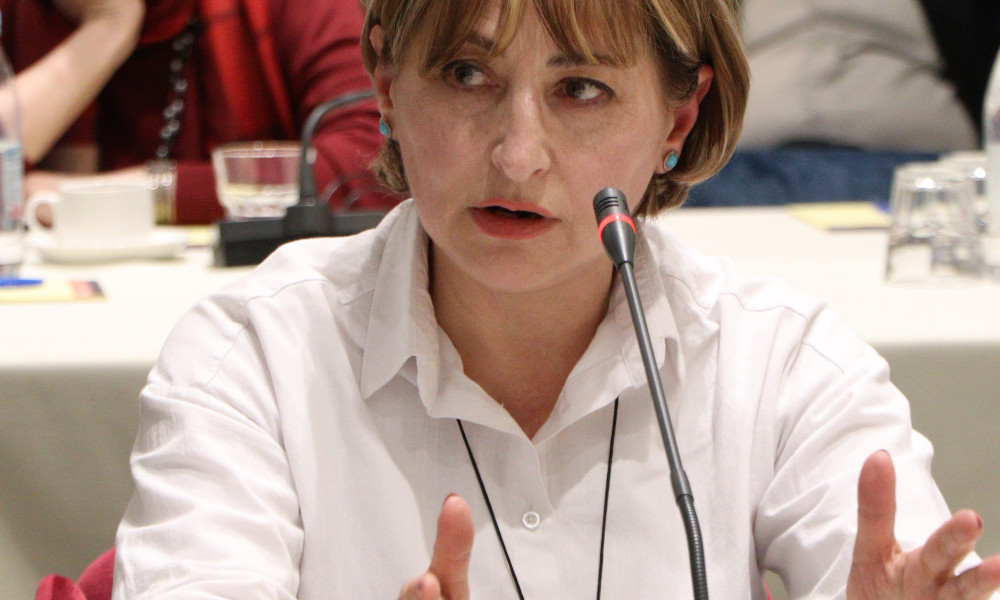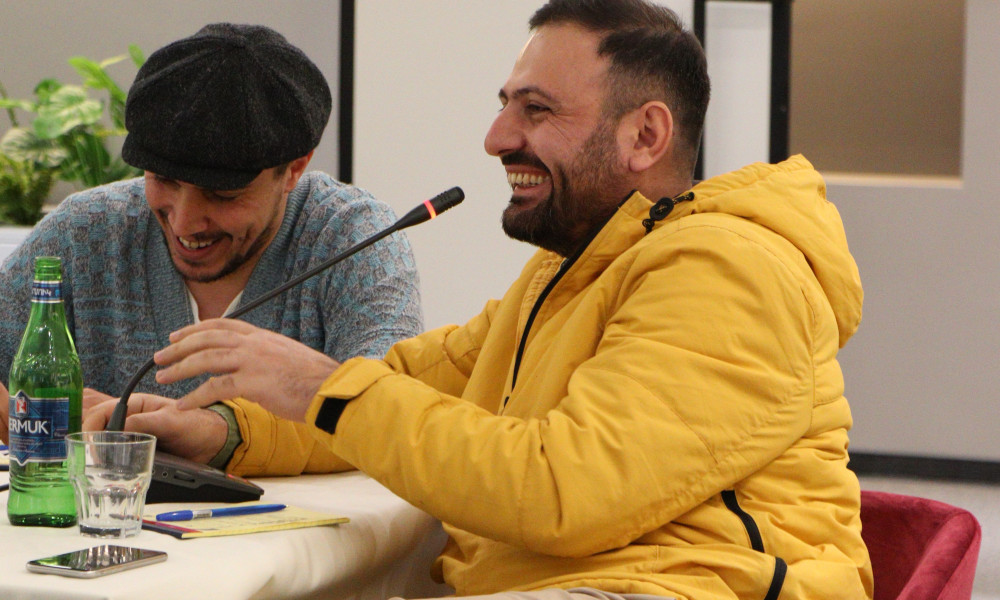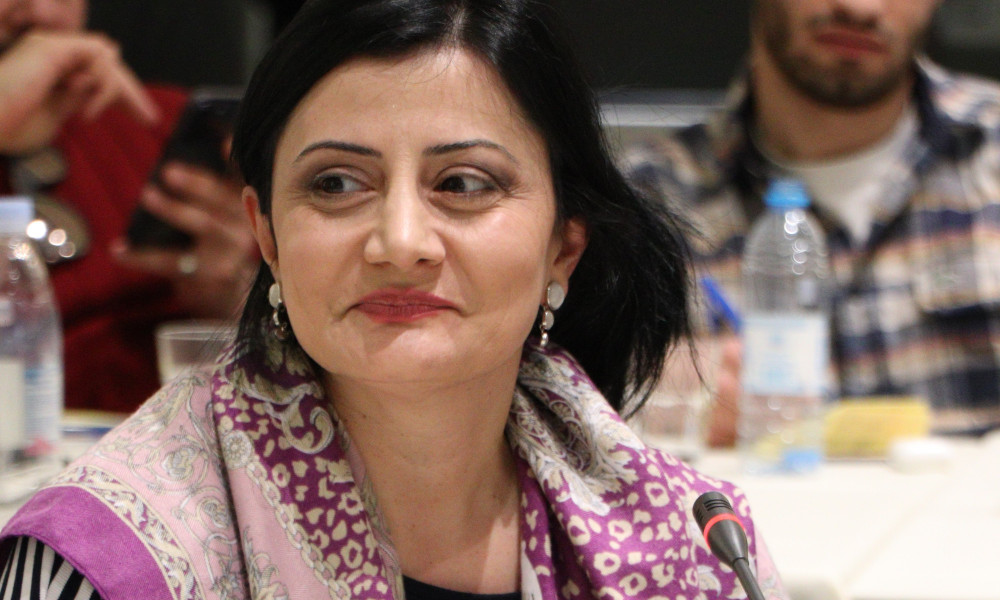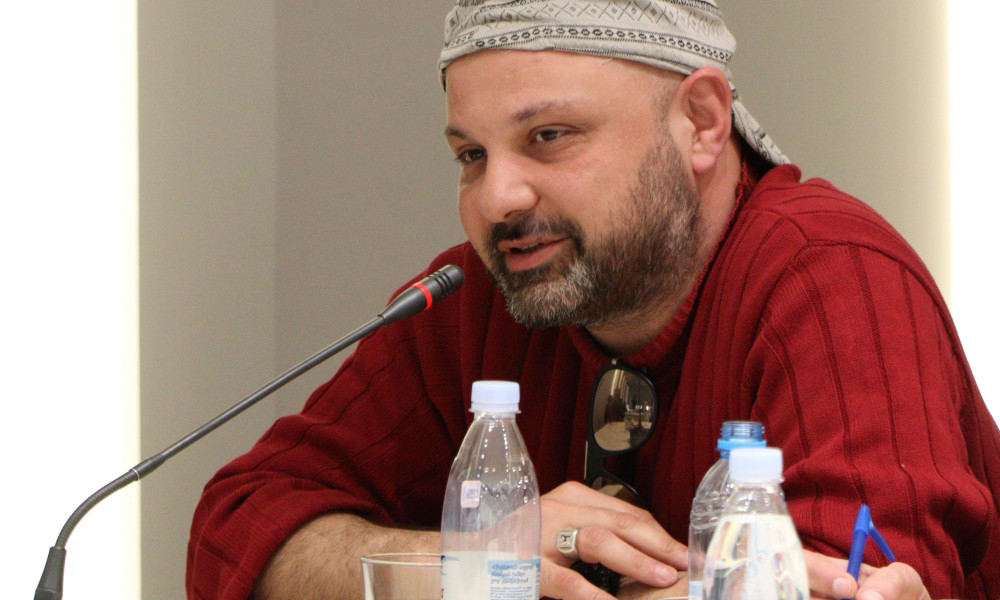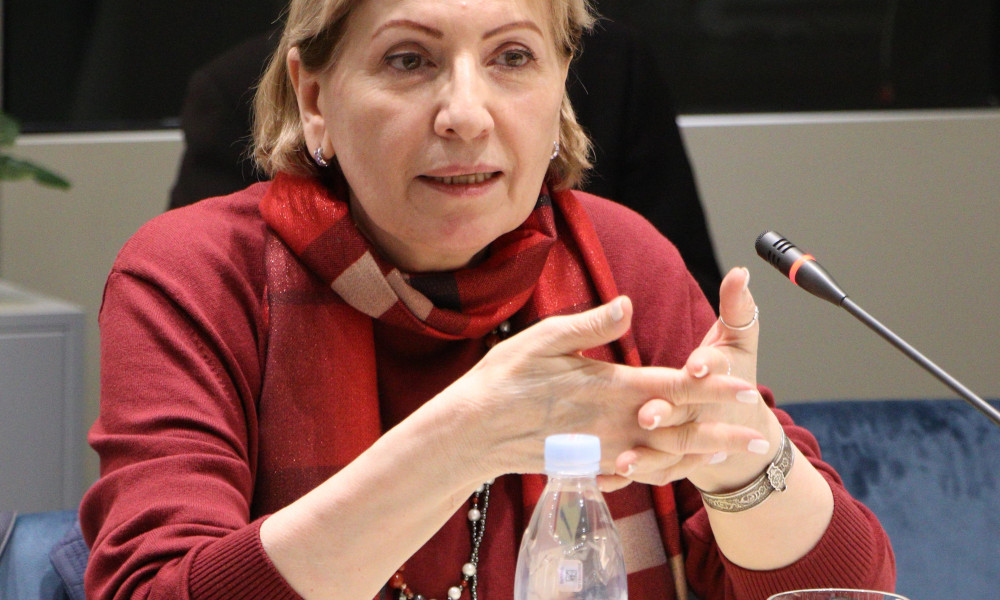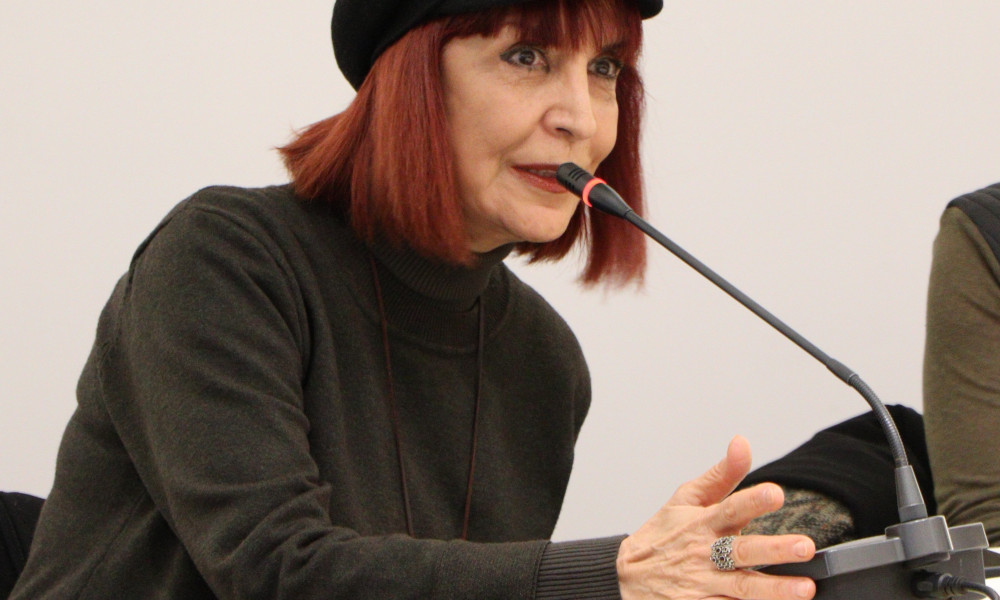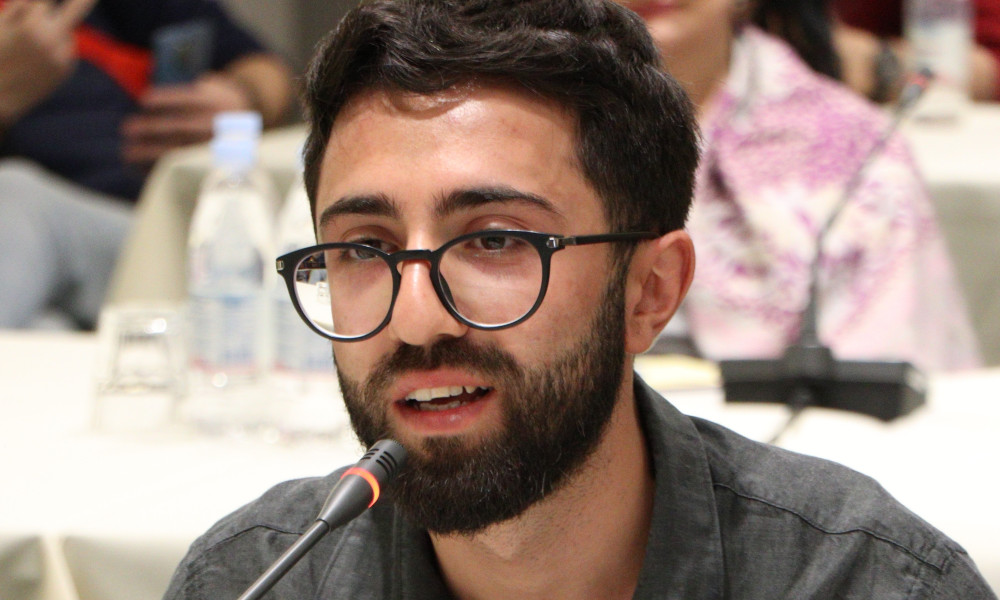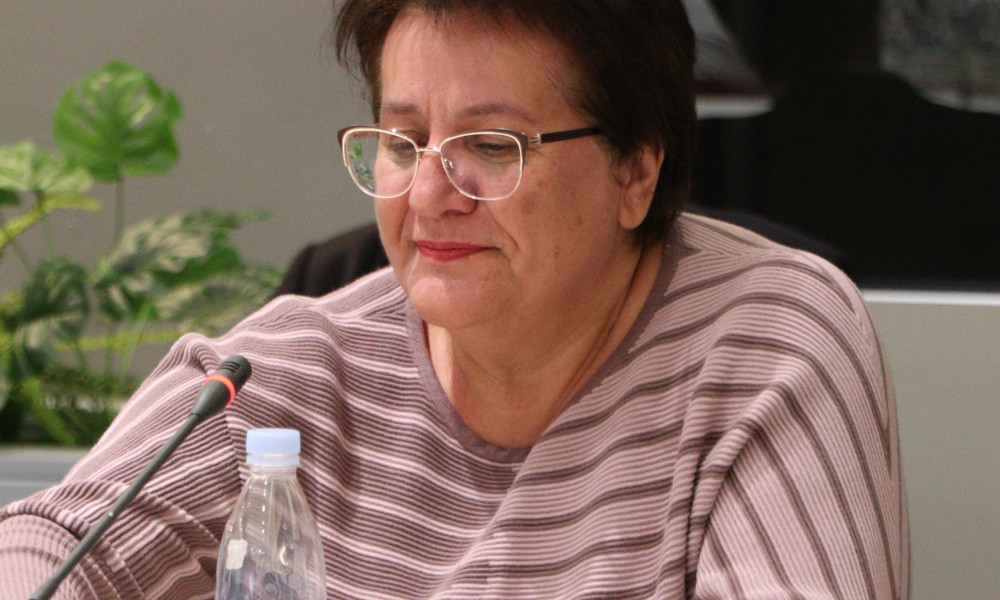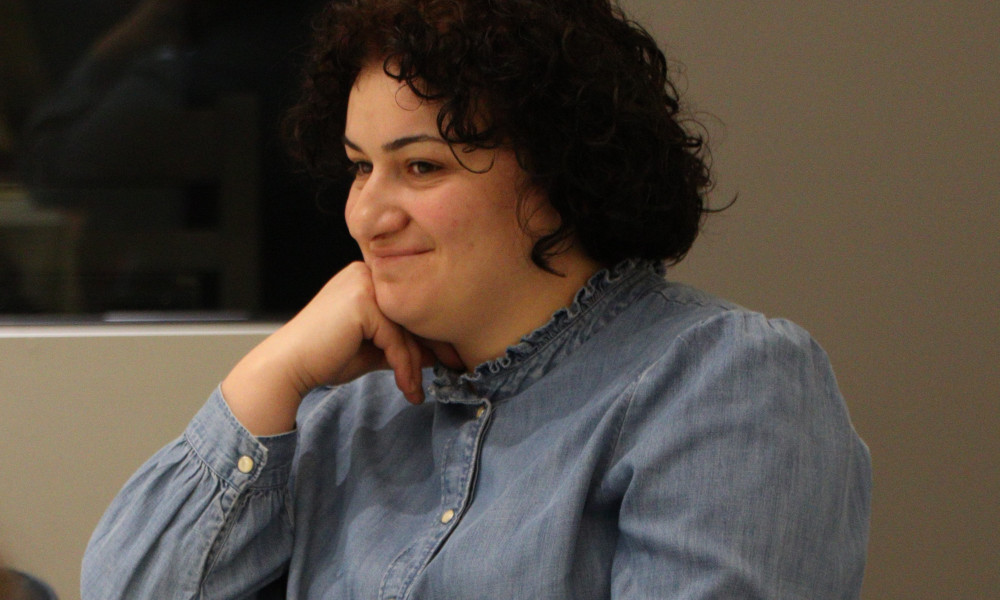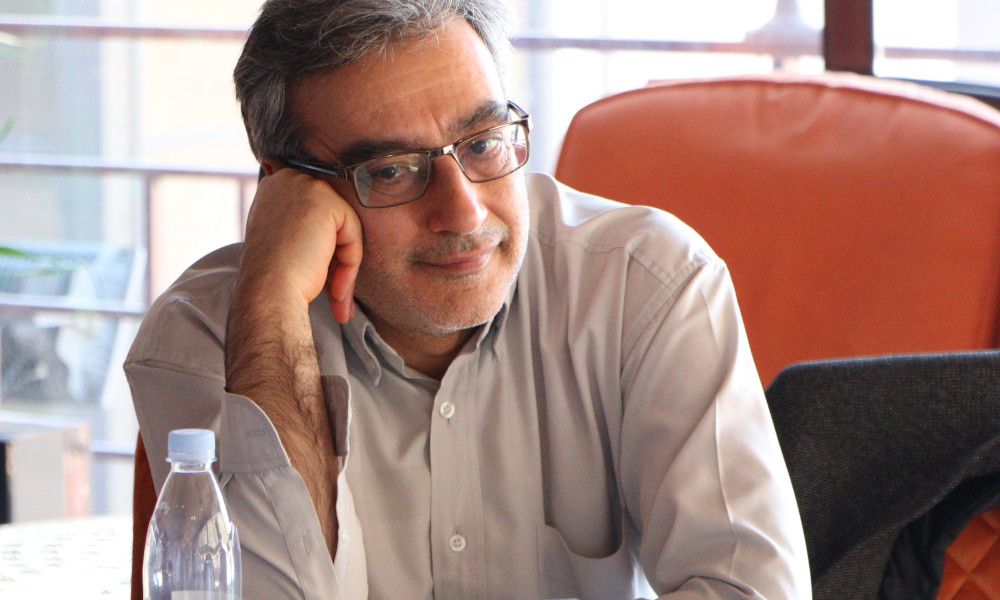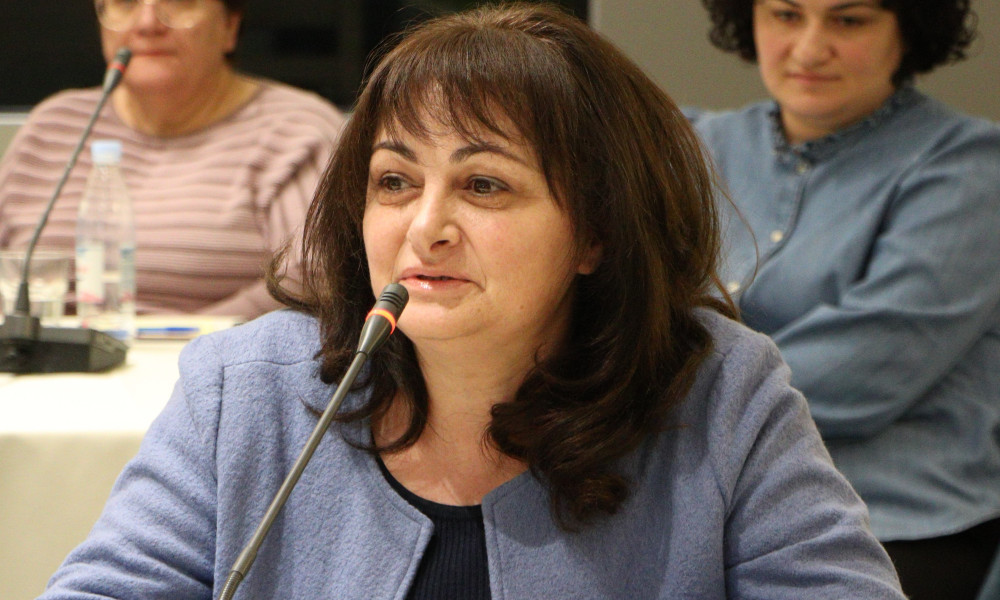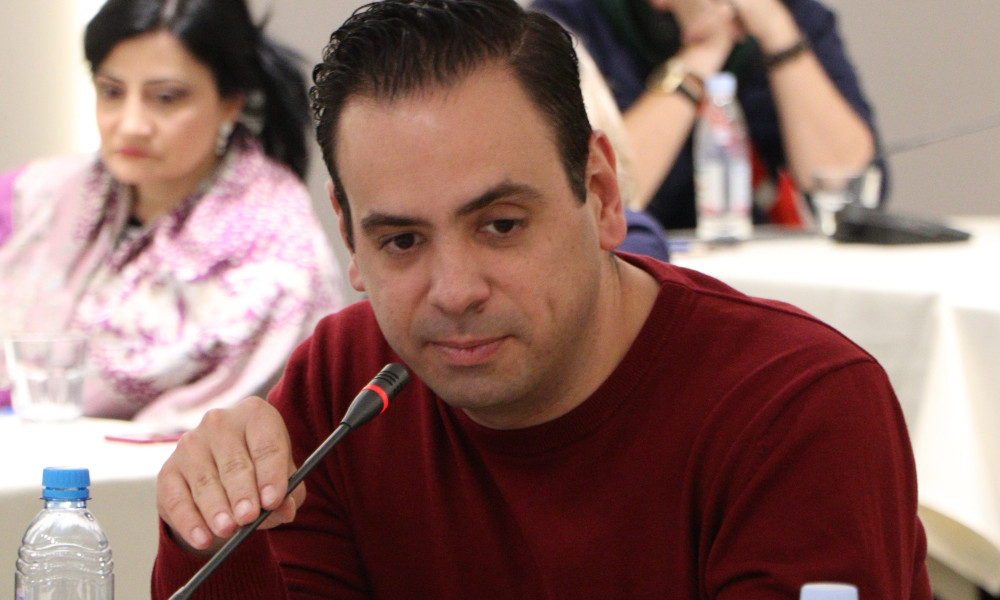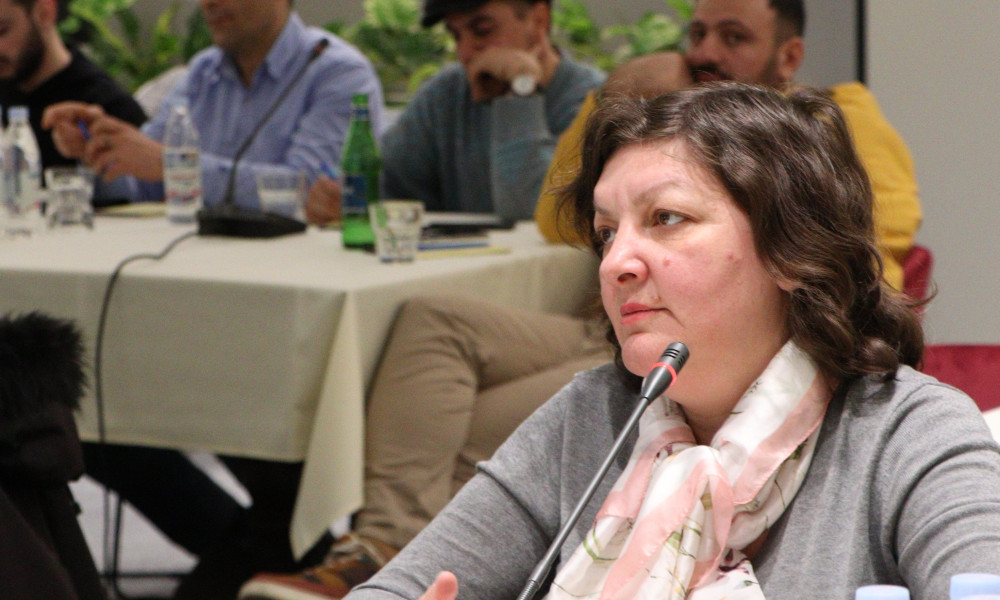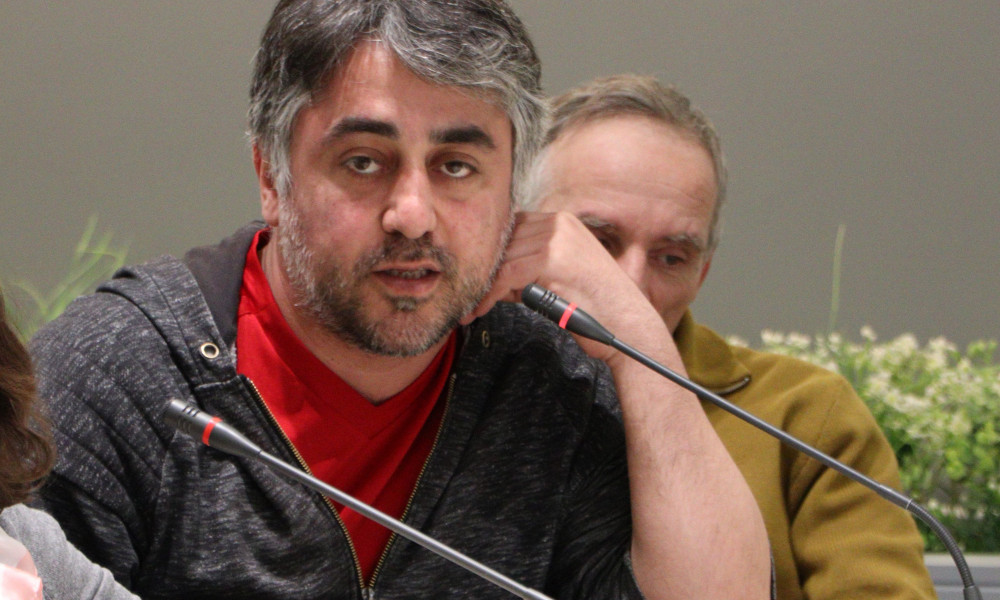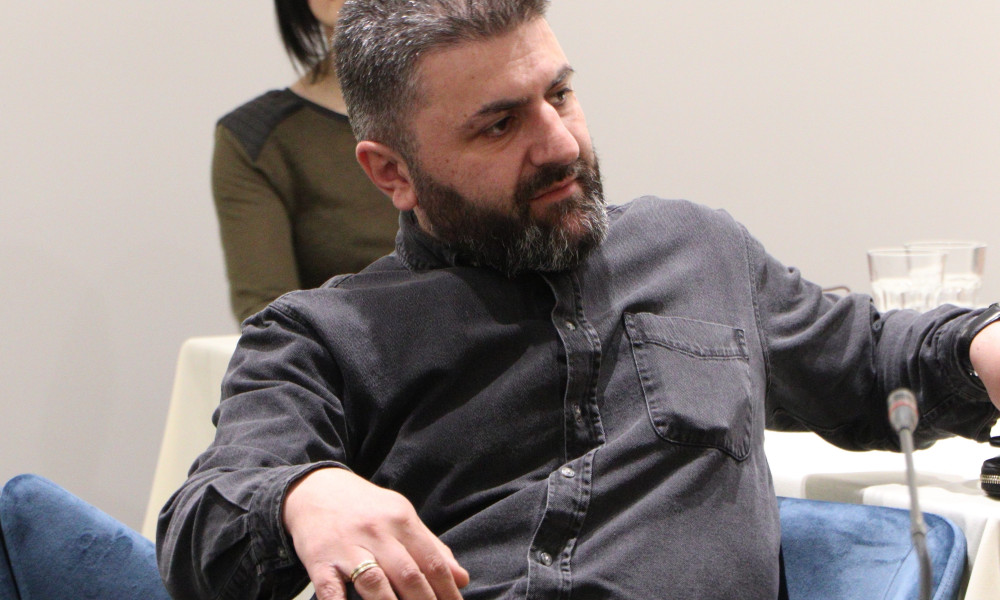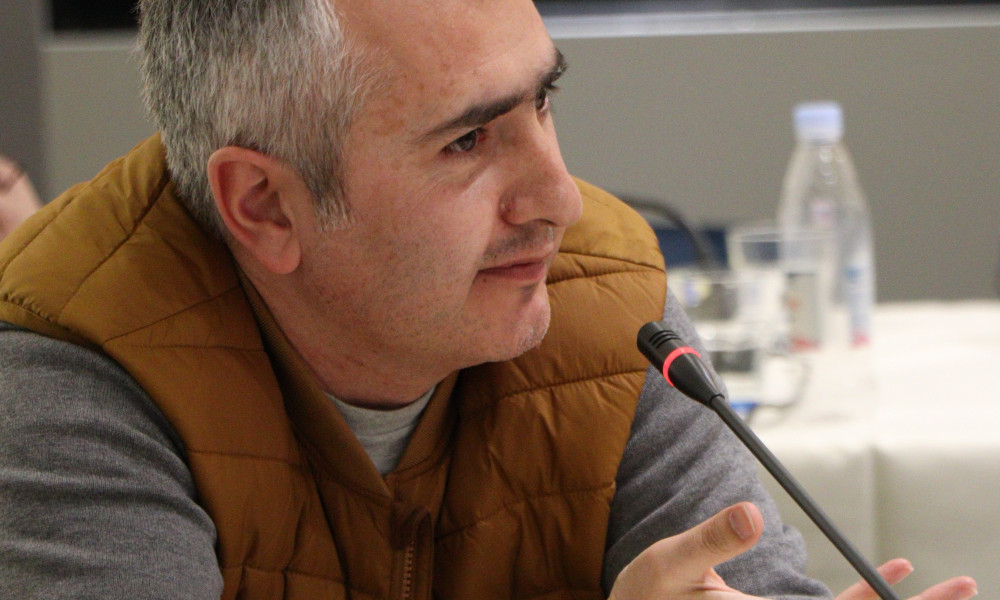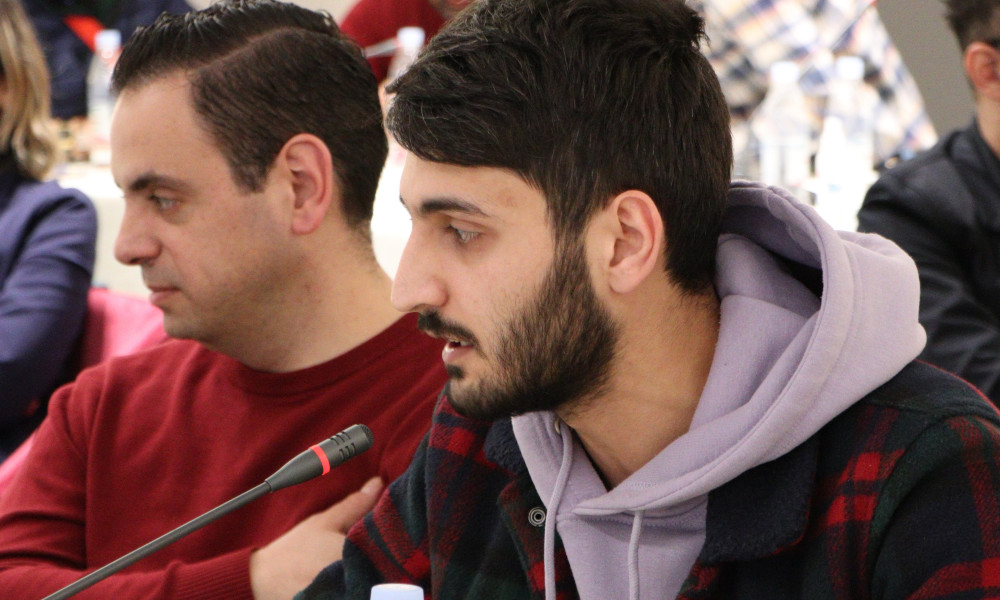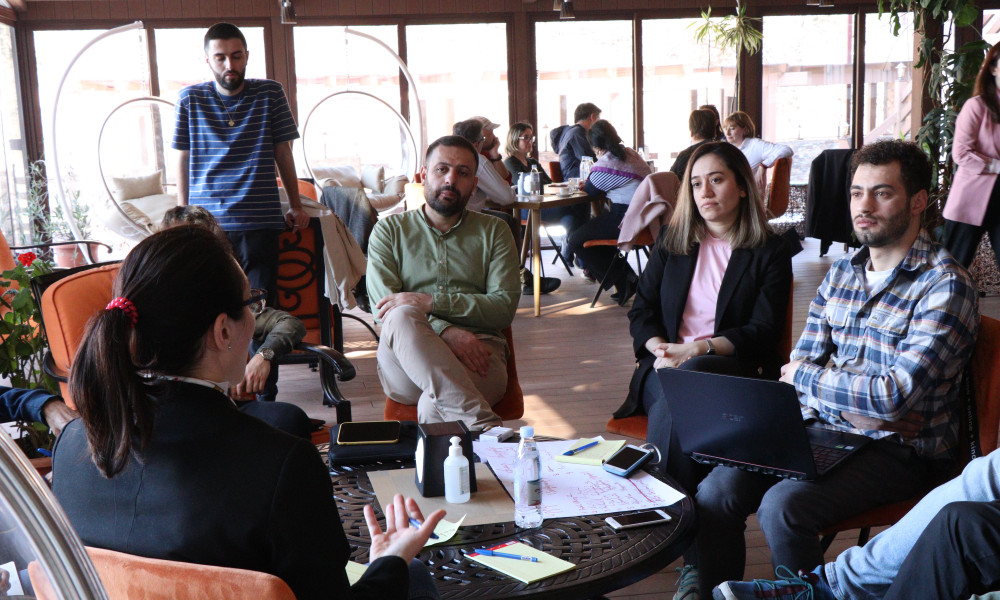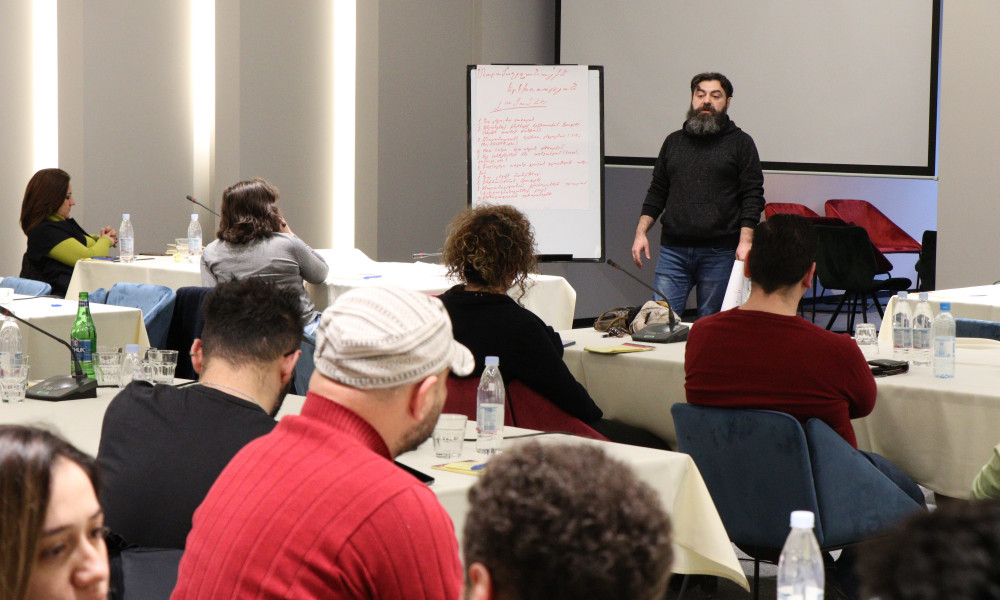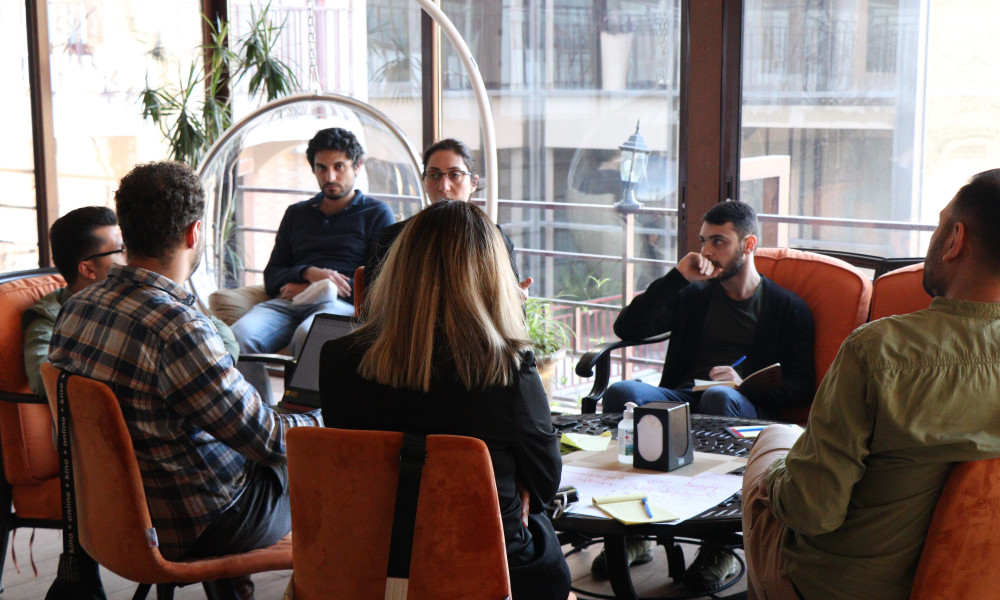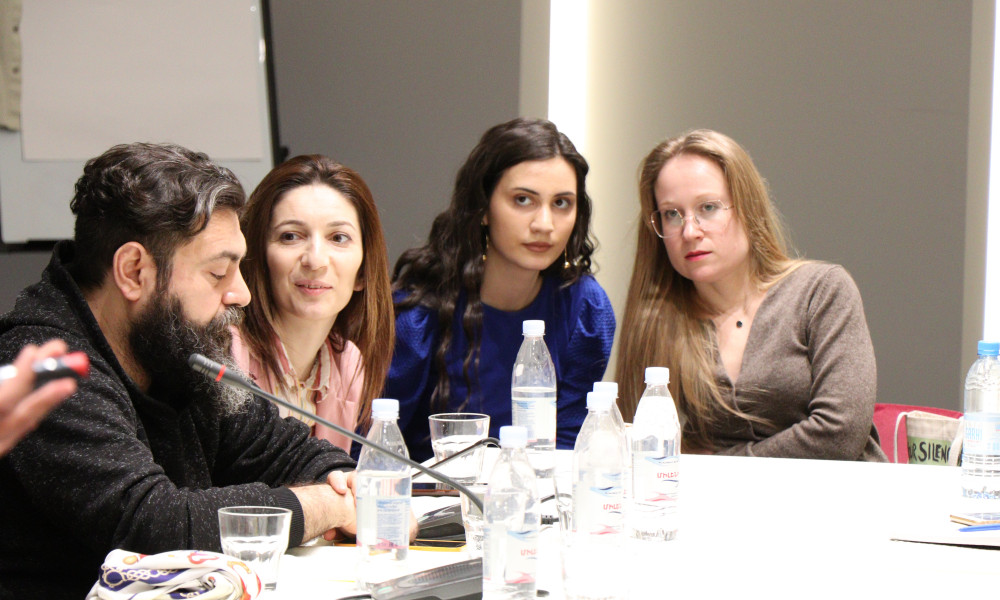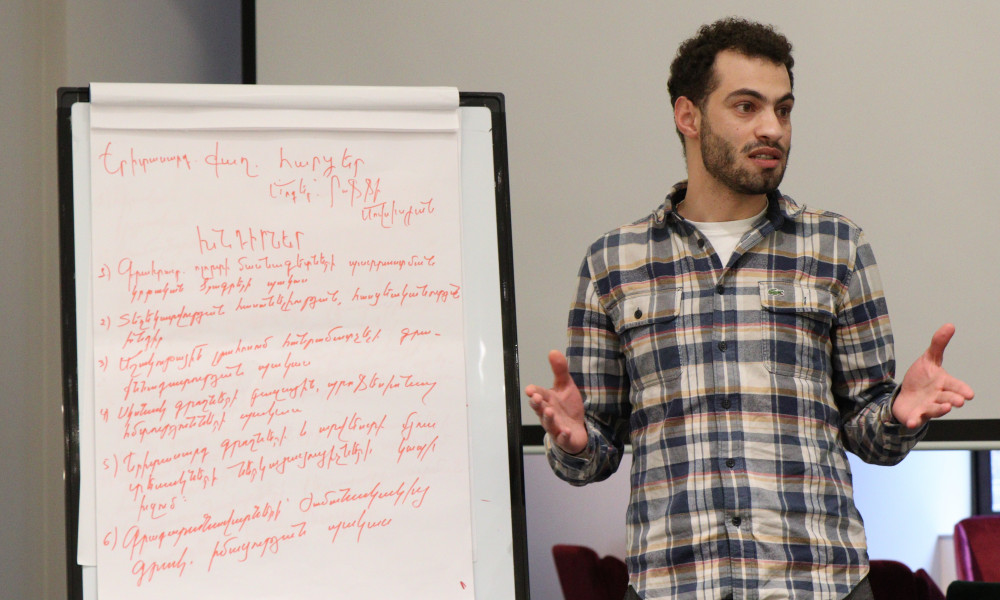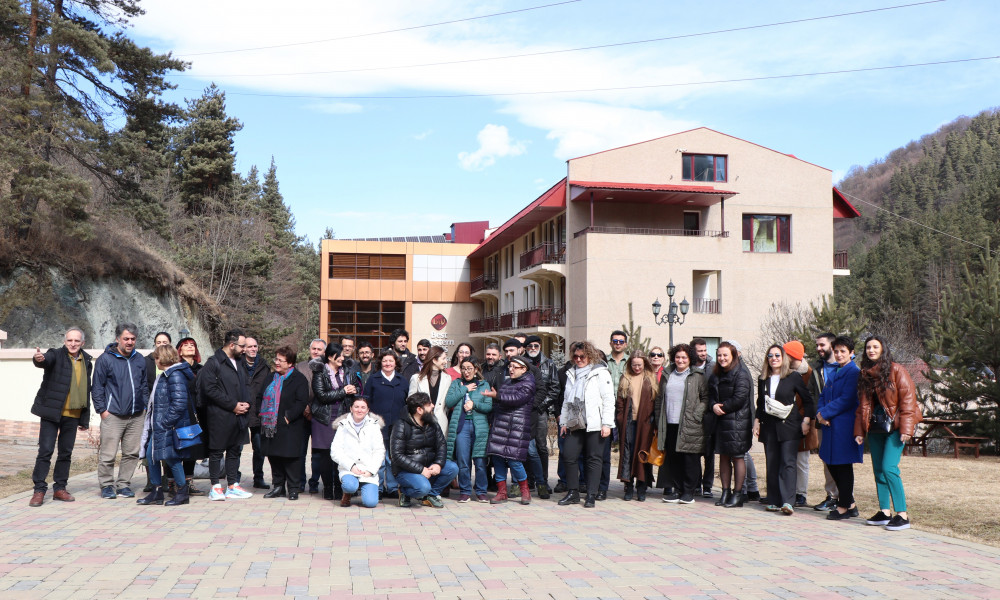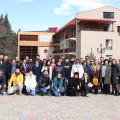Post/War: What to do?
With the support of the UN Armenia office, the PEN Armenia’s Annual Meeting took place as a retreat on February 26-27, 2022, as a result of which preliminary project ideas were developed for policies in four main areas – regional, linguistic, gender, and youth. The organization’s Ethics Committee was also established.
The Annual Meeting was attended by 36 of PEN Armenia’s 62 members, as well as invited guests – Naira Sultanyan from the UN Armenia office; Polina Sadovskaya, Eurasia Program Director at PEN America; Taguhi Ghazaryan, Deputy Chair of the Standing Committee on Science, Education, Culture, Diaspora, Youth and Sport at the National Assembly; Gohar Mamikonyan, Head of the Department for Youth Policy, Supplementary and Continuing Education at the Republic of Armenia Ministry of Education, Science, Culture, and Sports; Armen Sargsyan, Head Specialist for Literature at the RA MoESCS; and Varser Karapetyan, Coordinator of Human Rights House Yerevan.
The meeting was opened and closed with a traditional reading of the PEN Charter. In the current state of Post/War, members were once again asked to pay particular attention to article 3 of the Charter, which states – “Members of PEN should at all times use what influence they have in favor of good understanding and mutual respect between nations and people; they pledge themselves to do their utmost to dispel all hatreds and to champion the ideal of one humanity living in peace and equality in one world.”
In his opening speech, PEN Armenia President Armen Ohanyan highlighted the significance of the Writers for Peace Committee meeting that had convened the previous day, the importance of continuous collaboration with the UN Peace and Development office, and welcomed the special guests, each of whom then presented their respective organizations, the challenges existing in this post/war state, as well as the current range of interests, approaches and opportunities, thus immediately setting the stage for a productive meeting.
The first plenary session ended with three-minute reflections consisting of a “circle of trust”, where each of the attendees presented their thoughts on the main theme for the meeting – “Post/War: What to do?”
The second half of the day was dedicated to work in smaller groups. The existing issues in each of the four policy areas were mapped, after which solutions were brainstormed and presented in the form of preliminary ideas.
REGIONAL POLICY
The war that has broken out in Ukraine did not just highlight issues in the smaller region of the South Caucasus (Armenia, Georgia, Azerbaijan, including non-recognized entities) but also focused on the potential birth of a new world (or world order).
The group discussed various formats for regional dialogue, focusing on Armenia-Azerbaijan, Armenia-Turkey relations. In particular, the discussion covered whether or not the 3+3 format was realistic given that Georgia had already reacted negatively to it, as well as a potential 1+4 format (Armenia + its four neighboring states), the AGUMB initiative (a sub-network consisting of PEN centers in Armenia, Georgia, Ukraine, Moldova, and Belarus; Azerbaijan does not have a PEN center), a 19+ format featuring collaboration between writers in Transcaucasia and Central Asian countries, and so on.
PEN Armenia has established a strong relationship with partners in the USA and is collaborating effectively with Pen America, as well as several Eastern European PEN centers. The organization has distributed the following roles among its members – coordinator for Armenia-Turkey, Armenia-Azerbaijan dialogue programs – Armen Ohanyan; contact person for relations with PEN Georgia – Asya Darbinyan; contact person for relations with PEN Russian-language centers – Hovhannes Aznauryan; contact person for relations with German-language centers – Hermine Navasardyan; contact person for relations with Spanish-language centers – Alice Ter-Ghevondian; contact person for relations with French-language centers – Shaga Yuzbashyan (as a reminder, the official languages of PEN International are English, French, and Spanish). Besides being a member of PEN International, PEN Armenia is also a full member of Human Rights House Yerevan.
Given varying definitions of our region, the group focused particularly on Armenia-Azerbaijan dialogue as a priority topic for the current period.
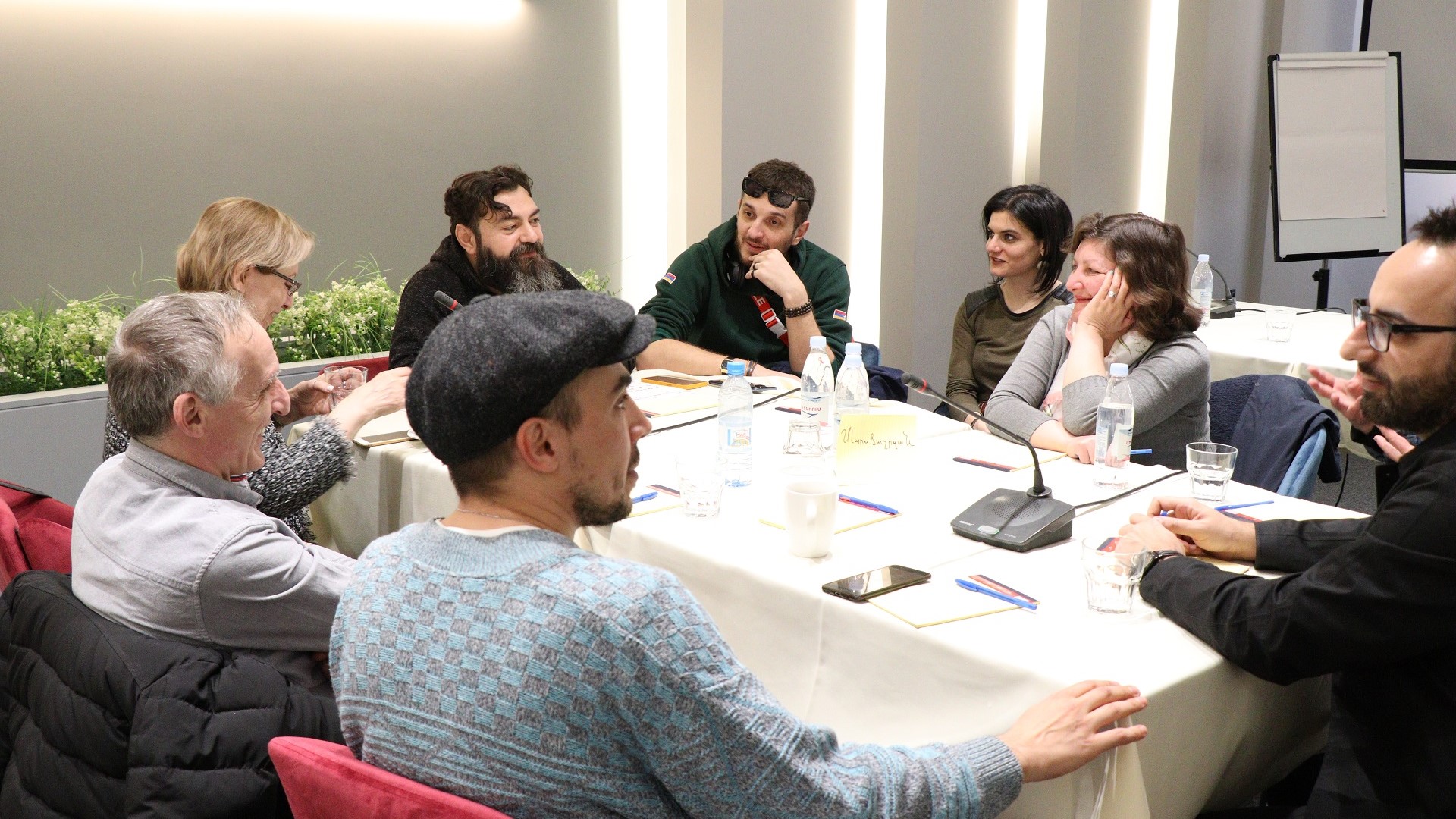
Moderator – Armen Ohanyan
Main implementer – PEN Armenia's Writers for Peace Committee
Relevant documents – Bled Manifesto, Charter
Participants: Aram Pachyan, Arman Grigoryan, Anna Gevorgyan, Vahram Martirosyan, Tigran Amiryan, Seda Shekoyan, Marine Petrossian, Taguhi Hakobyan, Karine Khodikyan, Karen Avetisyan
ISSUES
Given the lack of a pacifistic culture, the three marginalized sublanguages of peace (language of memory, language of “professional” peacebuilders, language of national cultural figures) do not lead to polyphony, they lead to cacophony. Although the authorities of the Republic of Armenia have declared their readiness to launch an era of peace, public sentiment continues to be dominated by the language of war, including deep-rooted military-patriotic narratives.
Talk about peace has been disconnected from reality for years, adopting an abstract vocabulary that, over time, has caused the societies to be unable to emotionally comprehend it, leading to a narrow focus on empathy within representatives of civil society and the international community.
Nationalism has established itself in the region as an expression of hostility toward neighboring peoples, the historization of identities and conflicts (the older it can be traced back to, the better), distortions of history in conditions of poisonous propaganda, where the voices cannot be heard of writers that speak contrary to the dominant narratives and narratives of “peaceful coexistence” have often been limited to the controversial Soviet past.
The whole population is suffering from profound post-war trauma. There is nobody who has not felt the tragedy of war in one form or another. There is a lack of a comprehensive policy for healing, and the consortium for psychological support coordinated by the Ministry of Emergency Situations provides free services only to the direct victims of the war and their families. There are no programs for healing and convalescence particularly for writers or cultural communities.
The group mentioned this in the context of grants for cultural dialogue programs (from the point of view of simply satisfying the demands of international donors) as well as to serve the propaganda of the ruling authorities without deviating from the official line.
The group meant the archaism of Soviet concepts such as Druzhba narodov (“Friendship of nations”) and Miru mir! (“Peace to the world”) in the literary and cognitive space today because they no longer match the spirit of the times and the attitude of the new generation.
Neither the painful collapse of national dreams and illusions, the insecurity of being the “defeated” in Armenia, nor the extreme propagandistic-exhibitive use of being the “victor” in Azerbaijan facilitate any decrease in tensions between the two societies. They lead to the formation of new gaps between them, forcing civil society in Armenia to be even more careful in its positioning, especially when it comes to active involvement in any peacebuilding dialogue. Public perceptions on both sides contain an inner scorn and attitude that the other does not deserve respect – in Azerbaijan, Armenians are seen as the puppets of the Russians, while Azeris in Armenia are perceived to be fulfilling Turkey’s bidding. The shadow of the “big brothers” that have been declared as frenemies heightens phobias of societies.
For decades, Armenia-Azerbaijan dialogue, public diplomacy and peacebuilding programs would take place in a “neutral zone” – often in hospitable Tbilisi, with the support and/or direct initiative of a fourth side (Europe, USA, international donors).
SOLUTIONS
The group brainstormed the development of a strategic concept paper and comprehensive action plan for the creation/establishment of a language for peace, in the broad sense. Through the initiative of PEN, this would bring together a large group of the best intellectuals, relevant institutions, and pro-peace medias in the region. The first step could consist of a three-day conference/workshop titled Language of Peace, with the involvement of potential partners.
(name subject to change)
Dialogue projects within Armenia have been considered important from the point of view of restoring an atmosphere for internal reconciliation and mutual tolerance.
As a result of the war, inner walls have been erected not just between different political camps but also various segments of society—the so-called elite and rabble—as well as different generations. In conditions of a constant media war, there seems to be an endless search for “traitors of the homeland” and “those who sold Karabakh”, which have damaged social harmony, making its restoration a necessary precondition for any progress in the agenda of peace. Simply put, the people must first find peace here and rediscover their self-confidence, so that they can then be ready for peace and reconciliation with their neighbors.
With the use of literary/creative potential, programs will be developed and implemented to overcome the post-war trauma. Events will be held for cross-generation dialogue, including radio and television programs.
Envisioning the expansion of regional dialogue (experimentation with new formats – bilateral, unmediated; bordering neighbors – 1+4, 3+3, 19+, AGUMB, etc.), this initiative will attempt to organize online discussions with writers in this “new neighborhood”, establishing new ties, with the later vision of transforming this into an international peace festival.
(initiator – Marine Petrossian)
A gathering within Armenia of writers/intellectuals that will discuss the responsibility borne by writers/intellectuals as well as potential future scenarios and possibilities to correct the errors of the past.
A travel, literary, dialogue project that aims to highlight the pain of others, including countries and peoples that experienced wars and armed conflict in the late 20th and early 21st centuries. These experiences will be used to create travelogues, memoirs, and articles, making the stories of people that overcame complex conflicts available to a broader audience, thus facilitating the reduction of hostilities.
The project will also include an online media campaign as well as participation in international platforms and panel discussions of partner festivals.
The creation of a multilanguage, online, literary, interactive platform, where the sides will review translated versions of each other’s works. Armenian literary critics will review samples of classic and contemporary Azerbaijani literature and readers will comment, critique, and discuss them (like a cross between Goodreads and Rottentomatoes) and vice versa. A book or text will be subjected to review and critique competitions will be organized periodically. The platform may be further developed with the inclusion of other languages (Turkish, Farsi, Georgian, English, and so on), and may go beyond literature, expanding to re/viewing of other cultural pieces of the neighboring country such as theater, cinema, fine arts, and so on.
(initiator – Arman Grigoryan)
A manifesto of writers/artists that will declare the new ethical and esthetical principles for peace, reconciliation, and good neighborly relations, which can then be adopted by intellectuals in Transcaucasia as well as the broader region.
(proposed by Karine Khodikyan)
The objective of this program is to strengthen and develop the literary, artistic community, overcoming the post-war trauma and creative crises, facilitating mutual support in an artistic setting and the reestablishment of a caring atmosphere, including overcoming feelings of hostility and animosity toward neighbors.
A project on regional alienation (decreasing the gap of mutual translations, cultural cross-penetration, co-creation initiatives).
The CC Hub (CC as both Co-Creation and Creative Caucasus, also Creative Commons license system implementation can be discussed) will bring creative minds in the region together around universal human challenges such as climate change, pandemics, technological revolutions, and hybrid wars.
(initiator – Seda Shekoyan)
Thematic courses on the language of tolerance, self-control, negotiation skills, master classes and meetings with experts on written communication, speech-writing, media literacy, cyber security.
Lib-tram is one of the multisectoral, long-term programs of PEN Armenia and fundraising is currently underway for its implementation. Given that large donors have not shown much interest in the program, a decision has been made to implement it in small steps. The publication of Armenian within us collection is one of the first steps already taken.
LINGUISTIC POLICY
The erstwhile lingua franca of the South Caucasus, Russian, is now in retreat, and its place is being taken up by the global language, English. The asymmetry of the linguistic map (Armenian and Azeri are ethnic minority languages in Georgia, while Azeri and Armenian have been taught in each other’s countries for decades as “the language of the enemy”) is also an issue. Azeri can be understood by the Turkic world and is part of a larger linguistic geography, while small and unique languages like Armenian and Georgian, which constitute the foundations of their language-based cultures, are now also the bedrock of their national speech in their status as official state languages. Linguistic policy—including reforms, issues of liberalizing language, protection of dialects and local variants, minority languages and their literature, other relevant cultural rights—is one of PEN Armenia's main focus areas, covered by the Translation and Linguistic Rights Committee.
PEN Armenia is also a translator-centered organization, where the role of literary translators is considered important as cultural ambassadors (kulturtraegers), whose efforts contribute to an in-depth and sustainable regional dialogue, not just mutual literary exchange, but also impacting public perceptions broadly for positive change.
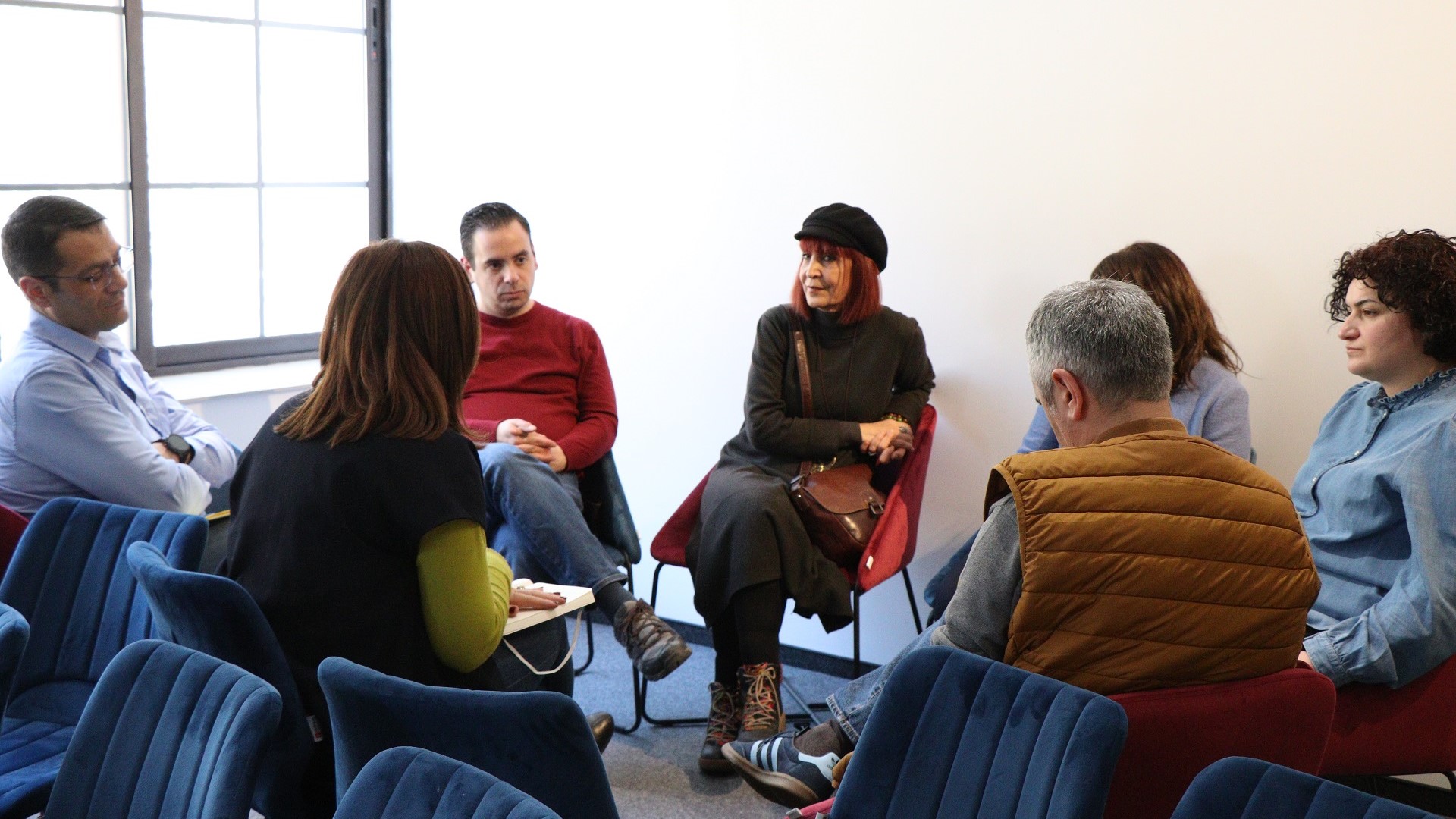
Moderator – Arevik Ashkharoyan
Main implementer – Pen Armenia's Translation and Linguistic Rights Committee
Main documents – Girona Manifesto on Linguistic Rights; Quebec Declaration on Literary Translation
Other relevant documents – The Republic of Armenia Law on Language
Participants: Asya Darbinyan, Anahit Aramuni-Keshishian, Nazareth Seferian, Narek Topuzyan, Marat Yavrumyan, Hermine Navasardyan
ISSUES
Overcoming language dogma is a necessary precondition for moving from protective isolationism to a more open, critical worldview.
The basis of linguistic policy in the Republic of Armenia consists of the RA Constitution, and the RA Law on Language, which should be subjected to a review. The main state body implementing the linguistic policy, the Language Committee, mostly carries out the function of being a language police, protecting the language from cases of misuse. After the change of government in 2018, the Language Policy 2018-2023 State Program has not been implemented and the current government does not have an approved state program in this area.
Although Armenian has been declared as the state language by the RA Constitution, one of its branches, Western Armenian, is included in UNESCO’s list of endangered languages.
SOLUTIONS
Development of a “legislative code”, participation in the linguistic reform agenda and lobbying.
Development of alternative concepts and their dissemination.
Liberalization of language, liberating Armenian from ethnocentric violence.
Digitalization and automation of Armenian, creation of a language model, development of projects that enrich the language corps, raising awareness of issues.
Projects for the protection and integration of Western Armenian.
There is a common practice of publishing literary anthologies of conflicting sides which, in most cases, do not interest broad groups of readers. It would be more effective to publish an annual periodical (including in electronic format), which could be used to develop a sustainably growing audience of readers, who then wait for the next issue to be published.
Anthologies in English are the main tool for introducing local literature to international literature markets, publishers, and editors. In the past, there has never been an attempt to use a single anthology to present the writers from all the countries in the region, including those from conflict zones as well as those writing in ethnic minority languages, because each state has tried to promote only their own national literature.
(title subject to change)
This is a series of educational and illustrated books for schoolchildren of different ages that is dedicated to changing public perceptions, encouraging the sensitivity of language, and overcoming conflicts (from interpersonal to international), developed through different methodological guides, manuals, and exercises.
GENDER POLICY
Gender issues have been discussed in Armenia for a long time. Although both the RA Constitution and local legislation as well as the international conventions that Armenia has signed oblige the state to secure gender equality, there are still many gaps in this area and lots to be done. The traditional patriarchal system and gender roles remain, while the country also experienced the Soviet-era emancipation of women—as a result of which women came to bear the double load of working and taking care of the house—and the unemployment caused by the post-Soviet socioeconomic crisis led to lesser involvement by women in work outside the house (when jobs were available, preference was given to men) as well as the collapse of organizations that facilitated the employment of women (kindergartens, after-school facilities, and so on) gradually pushed women out of economic and public life.
Furthermore, the Karabakh conflict, which remains unsolved since independence, and the wars associated with it, have led to the consolidation of traditional patriarchy and a social structure where everything revolves around war and security, where men are valued as soldiers and women as “mothers who bear heroes”.
As an organization for the protection of rights, PEN is an advocate for gender equality and seeks to protect women’s rights. PEN Armenia has a Women Writers’ Committee, which is a member and active participant of the international committee’s work in this area.
It should be noted that while the positive example of Svetlana Alexievich exists in the region (The Unwomanly Face of War has also been published in Armenian), the creative potential of Armenian women writers has not yet been used, their voices are not well heard beyond the borders of Armenia.
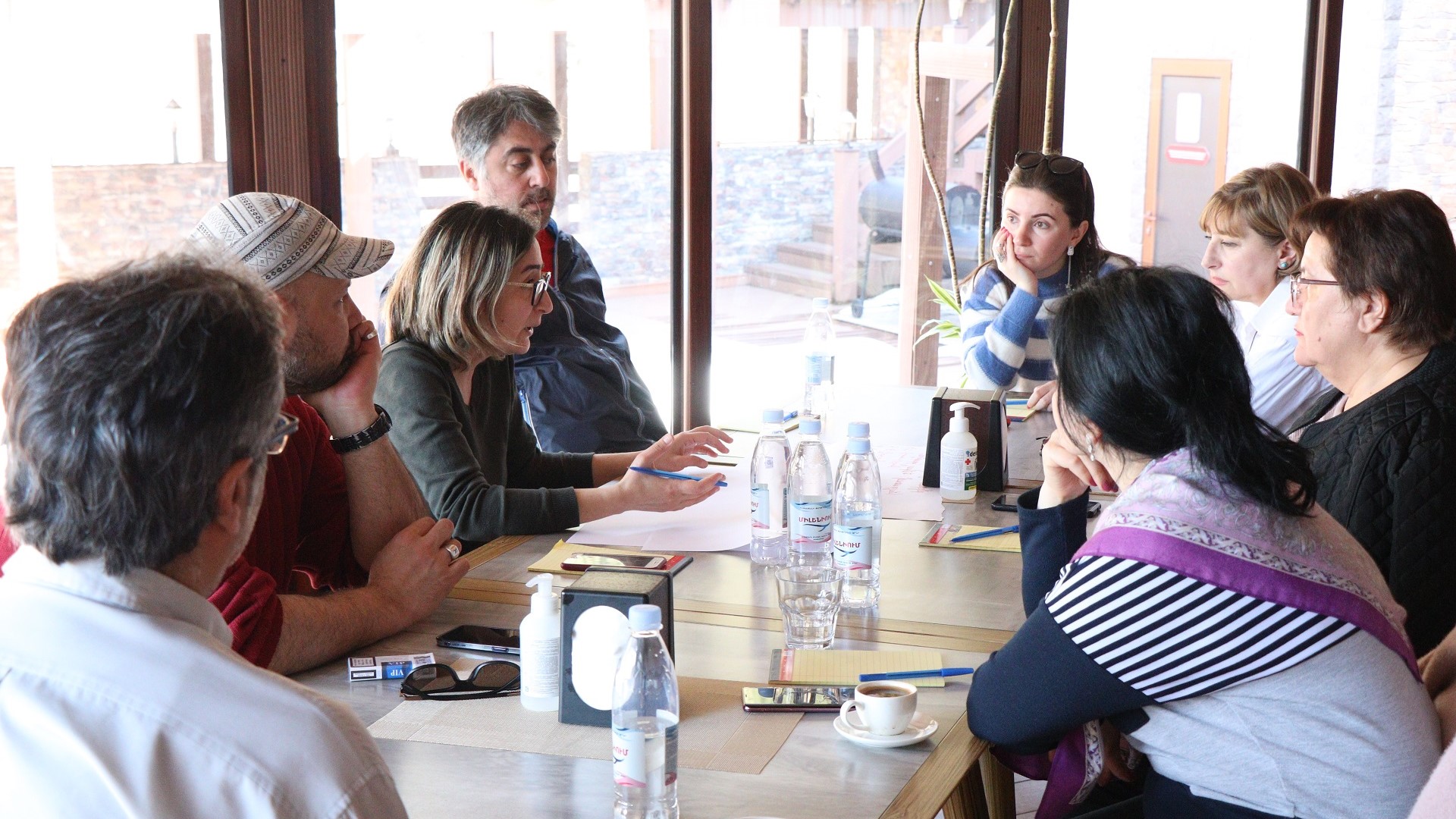
Moderator – Lusine Kharatyan
Main implementer – PEN Armenia's Women Writers’ Committee
Main document – PEN International Women’s Manifesto
Other relevant documents – RA gender policy current strategy and program
Participants: Lilit Karapetyan, Narine Kroyan, Hasmik Hakobyan, Susanna Harutyunyan, Gevorg Ter-Gabrielyan, Yuri Manvelyan, Vigen Galstyan
ISSUES
Schools, education as factors in the formation of gender perceptions, approaches, roles.
It is more difficult for women past 50 years of age to find jobs than it is for men. After having children, women spend their time in raising them and do not work (although the proportion of women that have university degrees is incomparably higher); many communities do not have a kindergarten or schools that offer after-school facilities, because of which women cannot work because they have to take care of the children.
The family as the basis of public alliance and the traditional distribution of roles in families.
Women that have suffered from wars and participated in them, women that have lost their child, widows of those killed in fighting, and the stories of other such women must be protected from becoming an instrument in military-patriotic propaganda.
SOLUTIONS
Developing a package of proposals for gender education, which will not only provide for greater inclusion of women writers in the content delivered by the education system, but also promote works facilitating gender education suitable for various age groups.
More active protection of writers that are being persecuted, expressing a position both internationally and locally.
YOUTH POLICY
The current situation in Armenia can be described as a demographic crisis – an aging population, where the youth has ended up as a more vulnerable age group. The absolute majority of those killed in the war were 18-20-year-olds who were military conscripts. A generation of zoomers has become the direct bearer of post-war trauma, losing many members of their own generation—their classmates, university friends, neighborhood acquaintances, brothers and partners—and ending up as veterans scarred by the war. On the other hand, the role of the locomotive of society is traditionally attributed to this small group, the youth, who are expected to shape the future of the country, demand reform, and take on the torch for peacebuilding dialogue in the region.
Based on these facts, PEN Armenia has decided to form a working group, without any age discrimination, dealing with youth issues. In order to identify potential areas of collaboration, special guests at the meeting included Gohar Mamikonyan, who is currently holds the highest position in government on youth issues, and the discussion also covered the UN Security Council Resolution 2250 on Youth, Peace and Security, the working group of which included the volunteer participation of our partner, Polina Sadovskaya.
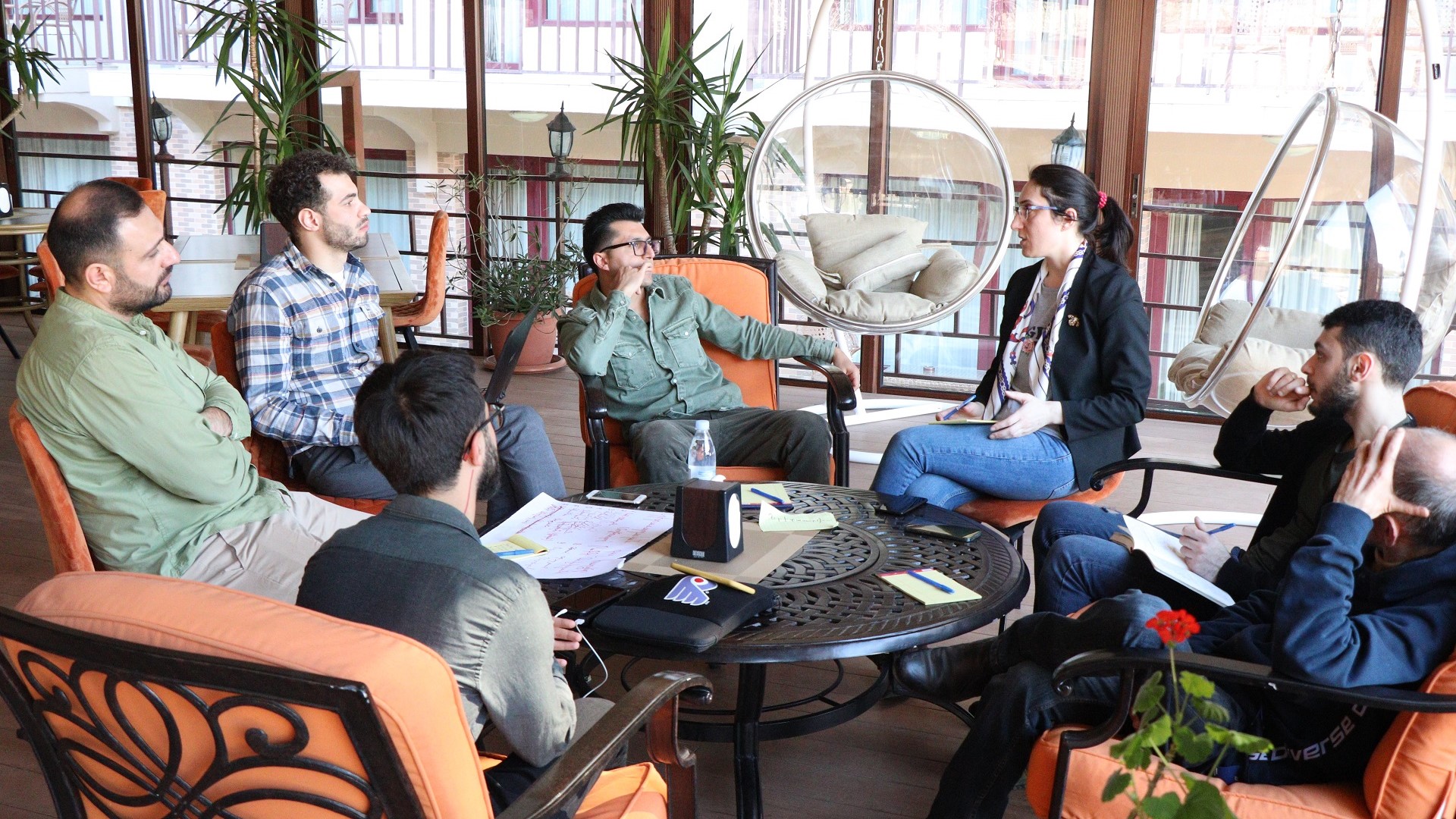
Moderator – Raffi Movsisyan
Main implementer – working group on youth issues.
Main document – UN Security Council Resolution 2250 on Youth, Peace and Security
Other relevant documents – RA State Youth Policy and Strategy 2021-2025
Participants: Karen Antashyan, Hovhannes Hovakimyan, Samvel Khachatryan, Christian Ginosyan, Ovsanna Shekoyan, Mher Arshakyan, Norayr Sargsyan
The Head of the Department for Youth Policy, Supplementary and Continuing Education at RA ESCS Ministry, and Head Specialist for Literature at the RA ESCS Ministry Armen Sargsyan.
ISSUES
There are issues of accessibility and targeting. The trauma is multilayered and complex, and it might take years to overcome it, if not decades.
In the post-war era, Armenian booksellers have seen an unprecedented rise in book sales. Although an analytical study of this has not been done, one can assume that the national insecurity of seeking professional psychotherapy, the absence of a tradition of confessions in church, and the desire to spare relatives any additional pain, all led to books as being seen as an alternative for a “heart-to-heart” conversation. PEN considers it important for this culture of healing through literature to establish itself in Armenia (bibliotherapy and writing therapy) and already has a project developed in that area, ready to be implemented.
The cultural market, particularly the literary market (booksellers not included) consists of middle-aged people, although the sector is developing and needs young specialists.
The book publishing sector, in particular, lacks literary agents and electronic publishers, and also requires more training and qualification programs.
There is a lack of literary critique, a marginalization of critical thinking, the “occupation” of the cultural cognitive space by the “great Armenians” and “living classics” as well as the “komsomolization” of youth groups and the use of the youth as instruments of propaganda.
There is a lack of basic, professional skills, isolation from regional and international dialogue, lack of knowledge of other languages, and so on.
This refers, in particular, to the severed connections between literature-cinema, theater, music, contemporary art at the local as well as regional and international level.
Librarians have one of the lowest salaries in Armenia, and it is an aging profession. Librarians are not known for their knowledge of modern literature. PEN Armenia places particular importance on librarians and sees them as potential supporters of peacebuilding initiatives.
SOLUTIONS
A project to re/train literary agents, electronic publishers and other specialists in the literary market through additional education and development of new qualifications.
The project includes a comprehensive study of the literary market, which will be followed by targeted training and qualification courses (with priority given to war veterans who will to work in the book market).
Awareness raising through the PEN Armenia's website and partner platforms providing information on grant-funded programs, festivals, residencies and how to take in them (pro bono consultations for applications, support). The objective is to take the youth that took part directly in the war or were impacted indirectly and make their voices heard within the country, in the region, and on international platforms.
A complex training program including education for literary critics, readers’ reviews as well as cultural journalists for the coverage of the literary and publishing sector in the post/war era.
After the war, everyone writes about “their own war”, creating a large body of text and often paying tribute to old narratives. Publishers are sometimes excited by sales and neglect the content side of their work. This process is not subjected to any kind of literary critique, culturology, or reader reviews.
The center will provide targeted support to young creatives that were negatively impacted by the war, facilitating their development through the encouragement of volunteerism and non-formal educational projects. From time to time, contemporary literature and global cultural contexts will be provided, creative writing and foreign language classes will be offered, as will programs facilitating dialogue with foreign youths. The center will operate at Human Right House Yerevan.
This is the creation of a collaborative platform for literature and other kinds of art for both local as well as regional and international levels. The creation was discussed of an online platform for young artists (a database of biographies, catalog, as well as capacity for online contact), where young people can get to know each other, receive specialized consultations (from mentors), fundraise, and implement collaborative projects.
This consists of the addition to library collections of anti-war, peacebuilding literature, translated works by writers from neighboring countries as well as curated self-healing, self-development collections, which will be accompanied by targeted training of librarians, which will lead, in turn, to positive changes in the perceptions of the bibliophile segment of society.
Note: we see libraries as safe spaces where the first article of the PEN Charter (Literature knows no frontiers and must remain common currency among people in spite of political or international upheavals) can be implemented in a more inclusive and accessible way (not everyone can afford to buy books, but anyone can use the services of a library).
Electronic publications with this content and attitude, along with the creation/growth of electronic libraries, can also be considered as a separate project. PEN Armenia has already successfully implemented a course on the fundamentals of electronic publishing, which can be considered a prototype for the involvement of young people in electronic publishing.
The following morning, a meeting took place on organizational issues, during which Armen Ohanyan presented a report and announced the launch of a new subgrant project called PINK PEN, the objective of which is to use the potential of literature and art to facilitate positive changes in the position and attitude of society on LGBTI issues. Following that, guest speaker Polina Sadovskaya presented three main areas for collaboration with PEN America.
1․ Local PEN Centers’ support
The idea of creating the AGUMB collaborative subnetwork was presented, bringing together PEN centers in Armenia, Georgia, Ukraine, Moldova, and Belarus.
2․ Advancement of local literature
The possibility was discussed of involving writers and literary translators from the region in the World Voices festival. The panel discussion to be held in Tbilisi on April 12, involving the presidents of PEN Georgia, Armenia, and Ukraine was also presented.
3․ Advocacy and protection
The regional activities to be implemented in this area were presented.
Armen Ohanyan added that the Human Rights House Yerevan protection program was being implemented, which could be used not just by human rights defenders but also by writers, journalists, artists as well as other people involved in human rights work, if they felt they were being subjected to pressure of any kind.
The Ethics Committee of the organization was formed during the meeting, consisting of the following members – Hasmik Hakobyan (chairperson), Lusine Kharatyan, Karen Antashyan.
The two-day meeting ended with confirmation by PEN Armenia members that they were ready and willing to promote regional dialogue, after which they reaffirmed their loyalty to the values embodied in the Charter.

